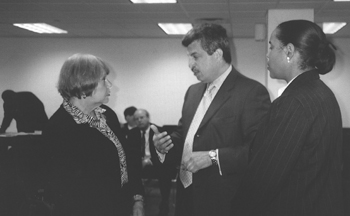|
Procurement
The Commission on Government Administration has had a long-standing interest in the state
contracting process. New York State’s purchases of goods, services and construction represent
a large portion of the state budget and outlay of taxpayers’ money – over $16 billion annually. State
contracts also represent an important market for businesses in the state. It is thus critical that the
state’s procurement processes be fair, open and utilize competitive bidding processes.
Surety Bonds
On April 14, 2005, the Commission held a public hearing in New York City, along with the Assembly’s
Task Force on Women’s Issues; Committee on Governmental Operations; Committee on Corporations,
Authorities and Commissions; Insurance Committee; Small Business Committee; Black, Puerto Rican,
Hispanic and Asian Legislative Caucus; and the Puerto Rican/Hispanic Taskforce. Testimony on “Access
to Surety Bonding on State Contracts for Small, Minority, and Women-Owned Businesses” was provided by
small, minority, and women-owned firms, state agencies, contractor groups, and surety industry representatives.
The hearing focused on the extent to which statutory bonding requirements for state projects pose a barrier to
small, minority, and women-owned businesses seeking to obtain state contracts, and examined the effectiveness
of state bonding assistance and bond waiver programs.
Contractors performing work for the state are generally required by State Finance Law and other statutes to secure
performance and payment bonds. These bonds, which are provided by surety companies, are a type of insurance
that protects the public owner, workers, subcontractors, and suppliers from financial loss if the contractor fails to
perform the contract. Surety companies approve bonds based on criteria such as financial strength and construction
experience, making it difficult for start-up firms to qualify.
New York State does have some bond waiver programs and bonding assistance programs in statute; however,
testimony cited difficulty in obtaining bonding for larger projects, shortage of training assistance programs, and
inadequate outreach efforts as some of the factors limiting small business survival and growth.
Responding to concerns raised during the hearing about better access to surety bonding, the Commission
developed legislative proposals introduced this year.
Related legislation
|
 Assemblywoman Joan L. Millman speaks with Wilfred Chabrier and Sandra E. Dixon from the Port
Authority of New York and New Jersey at the Assembly Hearing on surety bonding for small, minority
and women-owned businesses.
Assemblywoman Joan L. Millman speaks with Wilfred Chabrier and Sandra E. Dixon from the Port
Authority of New York and New Jersey at the Assembly Hearing on surety bonding for small, minority
and women-owned businesses.
|
Improved outreach efforts of the Department of Economic Development’s (DED) Divisions for Small Business
and Minority and Women’s Business Development (A.9070, Millman)
This bill adds individuals representing banking, community development financial, insurance or surety bonding
institutions to both DED’s Minority and Women-Owned Business Enterprise Advisory Board and the Small
Business Advisory Board. The bill requires the Division for Small Business’ information and outreach program
for potential state contractors to include information about surety bonding requirements. Other requirements of
the bill include the expansion of powers and duties of the Division for Small Business, and the Division of Minority
and Women’s Business Development, in providing and facilitating access to programs that provide business
development assistance. Additionally, the Office for General Services is required to include information about
surety bonding requirements in their annual regional training programs for minority and women-owned businesses.
Provisions for increased performance and payment bond waiver levels for small, minority and women-owned
businesses (A.9069, Millman)
Currently under State Finance Law, performance and payment bonds may be dispensed with, at the discretion
of the state agency head, for contracts of less than $100,000, or, for contracts not subject to multiple contract
award requirements, less than $200,000. This bill increases the threshold levels for performance and payment
bonds to be dispensed with to $500,000 for small and minority and women-owned businesses. The bill also
requires information on bonding requirements be included in advertisements for bids.
Mentor-protégé program for small, minority and women-owned businesses (A.9068, Millman)
This bill requires every state agency, department, and authority which has let more than $10 million in service
and construction contracts in the prior fiscal year to institute a mentor-protégé program. The chief executive
officer of each agency, in consultation with the Division of Minority and Women’s Business Development and
Division for Small Business, would establish requirements for approval of contractors acting as mentor firms,
requirements for protégé firms, and requirements for a process for establishing mentor-protégé agreements.
Require agencies to post contractor utilization plans on the agency Web site (A.9067, Millman)
Utilization plans are required by Article 15-a of the Executive Law, listing the certified minority and women business
enterprise (MWBE) subcontractors that the prime contractor will use to fill MWBE goals for construction contracts
over $100,000. This measure requires the contracting agency to post on its Web site the utilization plan and any
waivers of compliance issued.
Oversight of Services Provided to Minority and Women Owned Businesses (MWBE’s)
On October 25, 2005, the Commission joined with the Assembly Committee on Governmental Operations, its
Subcommittee on the Oversight of Minority and Women Owned Businesses, the Committee on Corporations,
Authorities and Commissions, the Committee on Small Business, the Puerto Rican/Hispanic Task Force, and
the Black, Puerto Rican, Hispanic and Asian Legislative Caucus in holding a hearing in Syracuse on the MWBE
certification process and related efforts to make it more effective. The Assembly members heard repeated
concerns that the process was too prolonged and efforts should be made to streamline state and municipal
certification processes. Several witnesses also emphasized the need to strengthen efforts to ensure that
contractors complied with the statutory goals of the MWBE law.
Procurement Stewardship Act
In 1995, the Procurement Stewardship Act was enacted in order to update the procurement laws of New York State.
The Act, which governs the purchasing of goods and services by the Office of General Services and state agencies,
is periodically re-evaluated every five years. Last year the law was renewed for a one-year period to allow for
additional time for a systematic evaluation of the law. The Commission on Government Administration, along
with the Assembly Committees on Governmental Operations, Local Governments, Small Business,
Environmental Conservation, Oversight, Analysis and Investigation held a hearing in September to review the
effectiveness of the act, with testimony from State Comptroller Alan G Hevesi, Daniel D. Hogan, the Commissioner
of the Office of General Services, and others. We will be working in the upcoming legislative session on various
proposals to strengthen the law. Among the focus areas identified by the Assembly are:
-
better utilizing purchasing dollars to achieve social goals such as encouraging small and minority and
women-owned businesses;
-
the use of recycled and remanufactured products, and environmentally-friendly, non-toxic products;
-
strengthening accountability and the ability to weed out “bad apple” contractors;
-
streamlining purchasing processes.
Contract Reporter. As part of the procurement reform process noted above, Assembly Member Millman has
sponsored a bill (A.8873) to improve the state’s weekly newsletter containing bid advertisements. The New
York State Contract Reporter, established by law in 1988, lists advertisements for goods, services and
construction needed by state agencies and public authorities. Its original goals were to provide one-stop
shopping for firms interested in bidding on state contracts, and to serve new, small, minority, and women-owned
businesses which might not have the resources or experience to otherwise discover bid opportunities. In the fifteen
years since its inception, the advent of the Internet and electronic procurement have altered the contracting landscape
dramatically, and both businesses and state agencies have expressed dissatisfaction with the Contract Reporter. In
addition, a review of other states and localities and the federal government bid information procedures has shown
that New York lags behind other jurisdictions in ease – and price – of access, comprehensiveness, and depth of
information available. This bill would bring New York in line with other jurisdictions by requiring daily updating, free
access, and more and better information for firms seeking to do business with the state.
Other important procurement initiatives in the Assembly this past session included:
Procurement Lobbying Reform. One of the key governmental reforms passed into law this year was Procurement
Lobbying Reform (Chapter 1 of the Laws of 2005). This legislation, co-sponsored by Assembly member Millman,
would require public disclosure and regulation of lobbying related to state contracts, and would mandate that
lobbying communications can only be directed to a designated contracting officer in the contracting agency. This
legislation will help ensure that contracts are awarded on the basis of value and merit rather than favoritism.
Use of Consultant Services. Past audits and accounting studies have found that the state over-relies on expensive
private consultant services, rather than on state employees, in areas such as information technology and
engineering. The Assembly passed two bills this session addressing this problem: A.1259 (John) would require
a cost/benefit analysis prior to contracting out state services. A.6542 (Lupardo) would require state agencies to
disclose the cost and number of consultants they employ. This bill has passed both the Senate and the Assembly,
but was vetoed by the Governor in late October.
Other
The Commission also supports the measures outlined below:
Out-of-State Placement: This new law authored by Assemblywoman Millman strengthens the oversight, control,
and accountability concerning the placement of disabled children in out-of-state programs and facilities. The law
provides New York state and local governmental agencies appropriate control and oversight over the financing
and quality of care received by such children when placed in out-of-state residential facilities and programs. The
law also establishes an out-of-state placement committee to develop requirements for out-of-state facilities and
programs and to maintain publicly accessible registries of such facilities/programs. Chapter 392, Laws of 2005.
Inmate Phone Services: Legislation sponsored by Assembly member Millman (A.7231-A), introduced and passed
by the Assembly this year, would remedy what has long been perceived as an unjust cost for families of prison
inmates: the cost of collect long distance calls from prisoners. These exorbitant phone charges have been
estimated at 630% more than a typical long-distance call, and pose a real barrier for families of inmates at
correctional facilities in remote locations seeking to maintain family ties. The Department of Correctional
Services receives 60% of the revenue from calls, among the highest in the nation, which it uses to fund services
for prisoners. This rebate represents an unfair additional tax for families of inmates, who tend to be among the
poorest in our society. The Senate did not pass this legislation.
|



 Assemblywoman Joan L. Millman speaks with Wilfred Chabrier and Sandra E. Dixon from the Port
Authority of New York and New Jersey at the Assembly Hearing on surety bonding for small, minority
and women-owned businesses.
Assemblywoman Joan L. Millman speaks with Wilfred Chabrier and Sandra E. Dixon from the Port
Authority of New York and New Jersey at the Assembly Hearing on surety bonding for small, minority
and women-owned businesses.